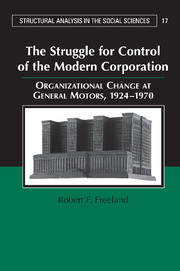 The Struggle for Control of the Modern Corporation
The Struggle for Control of the Modern Corporation Book contents
- Frontmatter
- Contents
- List of Figures and Tables
- Acknowledgments
- 1 The Modern Corporation and the Problem of Order
- 2 Creating Corporate Order: Conflicting Versions of Decentralization at GM, 1921–1933
- 3 Administrative Centralization of the M-form, 1934–1941
- 4 Participative Decentralization Redefined: Mobilizing for War Production, 1941–1945
- 5 The Split between Finance and Operations: Postwar Problems and Organization Structure, 1945–1948
- 6 Consent as an Organizational Weapon: Coalition Politics and the Destruction of Cooperation, 1948–1958
- 7 Consent Destroyed: The Decline and Fall of General Motors, 1958–1980
- 8 Conclusion
- Appendix: General Motors' Financial Performance, 1921–1987
- References
- Index
1 - The Modern Corporation and the Problem of Order
Published online by Cambridge University Press: 05 August 2011
- Frontmatter
- Contents
- List of Figures and Tables
- Acknowledgments
- 1 The Modern Corporation and the Problem of Order
- 2 Creating Corporate Order: Conflicting Versions of Decentralization at GM, 1921–1933
- 3 Administrative Centralization of the M-form, 1934–1941
- 4 Participative Decentralization Redefined: Mobilizing for War Production, 1941–1945
- 5 The Split between Finance and Operations: Postwar Problems and Organization Structure, 1945–1948
- 6 Consent as an Organizational Weapon: Coalition Politics and the Destruction of Cooperation, 1948–1958
- 7 Consent Destroyed: The Decline and Fall of General Motors, 1958–1980
- 8 Conclusion
- Appendix: General Motors' Financial Performance, 1921–1987
- References
- Index
Summary
Analysts of the modern industrial corporation tell a remarkable story. In it, the invisible hand of the market has become cramped and atrophied, perhaps broken beyond repair. The damage has been inflicted by none other than the modern corporation, its visible hand clenched into a fist, pounding away at the fetters of the market, struggling to bring about a “managerial revolution in American business.” This story is told not by critics of modern capitalism, nor by those advocating a return to unencumbered free markets, but by analysts who see this managerial revolution as inevitable and desirable. Only with its success has capitalism come into its own, attaining previously unimagined levels of productivity and profit. In their account, the modern corporation emerges triumphant precisely because the visible hand of management is more efficient than market allocation. At the heart of this efficiency are new forms of organization that lower the cost of governing the business enterprise. The triumph of managerial capitalism has led to the dominance of a new type of business organization: the decentralized or multidivisional form (M-form) characterized by a number of distinct operating divisions and overseen by a hierarchy of professional managers. Described as the “most significant organizational innovation of the twentieth century,” the M-form has been perhaps the most important single factor underlying the success of the managerial revolution.
The ascendance of the modern corporation is not the end of the story, for many of the enterprises that led the managerial revolution now face serious difficulties.
- Type
- Chapter
- Information
- The Struggle for Control of the Modern CorporationOrganizational Change at General Motors, 1924–1970, pp. 1 - 42Publisher: Cambridge University PressPrint publication year: 2000


